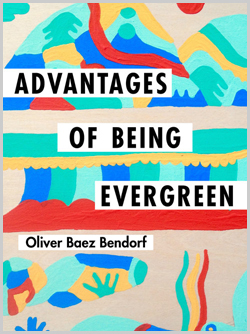Claire recommends Advantages of Being Evergreen by Oliver Baez Bendorf:
 Advantages of Being Evergreen was the winner of the 2018 CSU Poetry Center Open Book Competition, selected by Samuel Amadon, Leora Fridman, and Jane Lewty. Published in September 2019, this is a fresh book of poetry and a fresh prayer of transformation.
Advantages of Being Evergreen was the winner of the 2018 CSU Poetry Center Open Book Competition, selected by Samuel Amadon, Leora Fridman, and Jane Lewty. Published in September 2019, this is a fresh book of poetry and a fresh prayer of transformation.
Here is a book rooted in identity that does not seek definition in terms of what it is not, but rather defines the self through aggregation—a self that takes up as much sacred space as it needs without asking for, or receiving, permission. These poems do not remain uniform or predictable for the comfort of the observer, but evade strict formal, or even tonal categorization, in search of a more authentic and wild representation of a life lived intuitively.
I find that the titular concept of ‘Being Evergreen’ surfaces in these poems as a kind of homage to the transcendental power of resilience in the Trans experience, describing the self in its many undulating forms, nebulous, indestructible, branching out green and alive through all seasons. From the poem “Evergreen”:
What still grows in winter? / Fingernails of witches and femmes
What is evergreen, even in winter? Bodies, the poem points out. But not just any bodies—these are magical bodies, femme bodies that are perpetually in a stage of growth because they are forever in a state of transformation. Not even winter, or, let’s say, the heteronormative gender binary, can stop this transformation from happening. Here, the body is not a fixed object; it is turbulent and changeable as water, as in “Oracle”:…
today, I am a static channel / carrying the weight of logic
And Witches, water is the element of this book. In it, the speaker finds the archetypal site of the sacred rite of passage, and of eternal change. Always in flux, slowly bending and transfiguring the world over time, water seems to be where this speaker is drawn. These poems go to the river to find love, give their body over to the river stones:
River rock digs into my shoulders / like a lover who knows I don’t want / power.
Indeed, the river is the site and symbol of identity in this book:
I become my wildest self / through make-believe—to the river with this thunderous me: carrier and / carried
as well as a place to simply be held:
What I want from the river is what I always want:/ to be held by a stronger thing that, in the end, chooses mercy
Though water is essential to the life of these poems, they wonder also at the rest of the natural world, its weirdness and monstrosity, the way we ourselves mirror it. They relish in the shared monstrosity of body and earth, as in the poem “Witch Kept”:
… fur that creeps down / my belly and out / my thighs—I become a / wolf so that I may / speak to / my grandmother
In this pursuit of a connection with the primal, the poems in Evergreen sometimes reach a state of ecstasy that is undoubtedly spiritual:
over the lake / moonbeams reach / and reach for me, / spider arms smack / me over whose knee, and I howl.
Reminiscent of fairy tale, this poem is actively communing with ancestors via bodily transformation, a séance uniting the ideas of gender, animal nature and personal origin. This book brings a witchy queerness to these ideas that expands the Whitmanic notion that “I contain multitudes” in service of inclusivity. Here, that idea is a resistance to the history of oppression through language by trying on different monikers like linguistic costumes, embodying the essential spirit of both/and.
These poems are prayers, spells, incantations; populated by the ferocity of the natural world, the most tender corners of the human psyche, as well as witches, wolves, ancestors, ghosts, and voices that speak to us form beyond the known world. I can’t think of a single reason not to read it.
